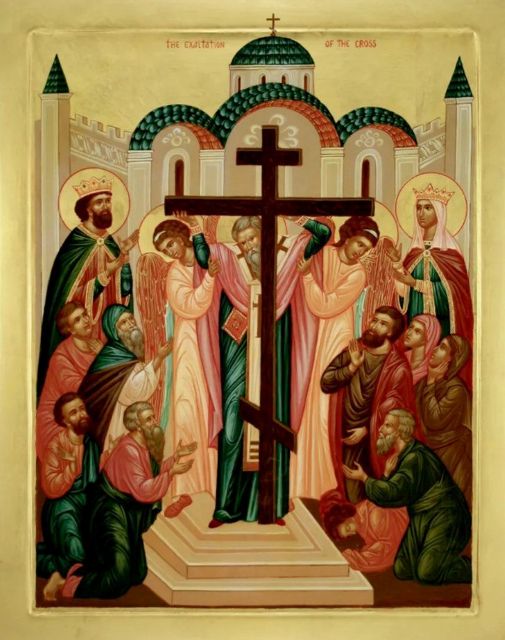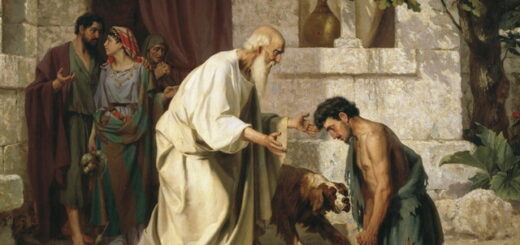Exaltation of the Holy Cross

Exaltation of the Holy Cross
The full name of the feast is the Exaltation of the Precious and Life-Giving Cross of the Lord. On this day, Orthodox Christians commemorate two events.
The first event is the discovery of the Holy Cross by Christians. According to Holy Tradition, the Cross was discovered in 326 in Jerusalem. This occurred near Mount Golgotha, where the Savior was crucified. The relic was discovered by Queen Helena, the mother of the Holy Emperor Constantine.
The second event is the return of the Life-Giving Cross from Persia, where it had been held captive. In the 7th century, it was returned to Jerusalem by the Greek Emperor Heraclius.
Both events had in common the fact that the Cross was raised before the people. This was done by turning it toward all directions in turn, so that people could venerate it and share the joy of finding the relic.
We find descriptions of the events of the discovery of the Cross of the Lord, which took place in the fourth century, in some Christian historians, such as Eusebius and Theodoret.
In 326, Emperor Constantine the Great resolved to find the lost relic—the Cross of the Lord—at all costs. Together with his mother, Queen Helena, he set out on a campaign to the Holy Land.
It was decided to conduct excavations near Golgotha, as the Jews had a custom of burying the instruments of execution near the site of their execution. Indeed, three crosses, nails, and a board that had been nailed over the head of the crucified Savior were found in the ground. According to tradition, a sick man touched one of the crosses and was healed. Thus, Emperor Constantine and Queen Helena learned which cross was the one. They venerated the relic, and then Patriarch Macarius of Jerusalem began to show it to the people. To do this, he stood on a platform and raised (“exalted”) the Cross. People venerated the Cross and prayed, “Lord, have mercy!”
According to Tradition, the Cross of the Lord was discovered before the feast of Easter, the Bright Resurrection of Christ. Therefore, the Exaltation of the Cross was initially celebrated on the second day of Easter.
In 335, the Church of the Resurrection of Christ was consecrated in Jerusalem. This occurred on September 13. In honor of this, the feast of the Exaltation of the Cross was moved to September 14 (according to the Old Style; according to the New Style, September 27). The bishops, who came from all over the Roman Empire for the consecration, told the entire Christian world about the new feast.
In the seventh century, the commemoration of the discovery of the Cross of the Lord was linked with another commemoration—the return of the Wood of the Life-Giving Cross of the Lord from Persian captivity.
In 614, the Persian king conquered Jerusalem and sacked it. Among other treasures, he took the Wood of the Life-Giving Cross of the Lord to Persia. The relic remained in foreign hands for fourteen years. Only in 628 did Emperor Heraclius defeat the Persians, make peace with them, and return the Cross to Jerusalem.
Historians are uncertain about the subsequent fate of the relic. Some say the Cross remained in Jerusalem until 1245. Others say it was divided into pieces and scattered throughout the world.
Currently, a fragment of the Cross rests in a reliquary in the altar of the Greek Church of the Resurrection in Jerusalem.
The Exaltation of the Cross is a Great Feast. The Great Feasts are dogmatically closely linked to events in the earthly lives of the Lord Jesus Christ and the Theotokos and are divided into Lord’s Feasts (dedicated to the Lord Jesus Christ) and Theotokos Feasts (dedicated to the Mother of God). The Exaltation of the Cross is a Lord’s Feast. This feast has one forefeast day and seven afterfeast days. A forefeast is one or more days before a major feast, the services of which already include prayers dedicated to the upcoming celebrated event. Accordingly, the afterfeast is the same number of days after the feast.
On the Feast of the Exaltation of the Cross, Orthodox Christians observe a strict fast. Meat, fish, eggs, and dairy products are prohibited. Food may be seasoned only with vegetable oil.
Troparion of the Exaltation of the Cross
O Lord, save Thy people, and bless Thine inheritance. Grant victories to the Orthodox Christians over their adversaries and by virtue of Thy Cross, preserve Thy habitation.
Kontakion of the Exaltation of the Cross
As Thou wast voluntarily raised upon the cross for our sake, grant mercy to those who are called by Thy Name, O Christ God; make all Orthodox Christians glad by Thy power, granting them victories over their adversaries, by bestowing on them the Invincible trophy, Thy weapon of Peace.
Based on materials from the website foma.ru




